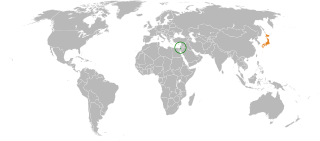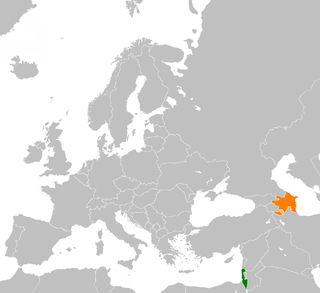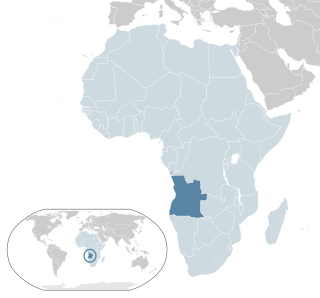
Foreign relations of Israel refers to diplomatic and trade relations between Israel and other countries around the world. Israel has diplomatic ties with 165 of the other 192 UN member states as of 12 December 2020. Israel is a member of the United Nations (UN) and a number of other international organisations. Israel maintains full diplomatic relations with two of its Arab neighbours, Egypt and Jordan, after signing peace treaties in 1979 and 1994 respectively. In 2020, Israel signed agreements establishing diplomatic relations with three Arab League countries, Bahrain, the United Arab Emirates, and Morocco. As of 2021, Israel had formal diplomatic relations with 168 other countries, while twenty-eight UN member states have either never established, or have broken off diplomatic relations with Israel.

Israeli–Japanese relations began on May 15, 1952, when Japan recognized Israel and an Israeli legation opened in Tokyo. In 1954, Japan's ambassador to Turkey assumed the additional role of minister to Israel. In 1955, a Japanese legation with a Minister Plenipotentiary opened in Tel Aviv. In 1963, relations were upgraded to Embassy level and have remained on that level since then. Today relations between the two countries have centered around economic and scientific partnerships which mutually benefit each country. The two countries also cooperated in defense.

Israel–South Africa relations refer to the current and historic relationship between the Republic of South Africa and the State of Israel. As of January 2024, South Africa maintains only “limited political and diplomatic interaction” with Israel due to the ongoing Israeli–Palestinian conflict.

Since the 1990s, the Republic of India and the State of Israel have had a comprehensive economic, military, and political relationship. In 1947, India voted against the United Nations Partition Plan for Palestine, but nonetheless recognized Israeli sovereignty in 1950. Israel opened a consulate in Bombay in 1953. Collaboration gradually increased as Israel became a key Indian ally amidst the India–Pakistan conflict; Israel supplied India with armaments, ammunition, and intelligence during the Indo-Pakistani War of 1971 and the Indo-Pakistani War of 1999. Full diplomatic relations were established in 1992, when India opened an embassy in Tel Aviv and Israel opened an embassy in New Delhi. Both countries are members of the I2U2 Group, formed in October 2021, and have stated that they have a strong bilateral relationship, sharing similarities in spirit and facing common challenges, increasingly cooperating in the industrial and technological sectors.

Azerbaijan and Israel began diplomatic relations in 1992 following Azerbaijan's independence from the Soviet Union. Azerbaijan is one of the majority Muslim countries, alongside Turkey, Egypt, Bahrain, United Arab Emirates, Jordan, Kosovo, Morocco, Albania, and the other former Soviet republics to develop bilateral, strategic and economic relations with Israel.

Colombia–Israel relations are the diplomatic relations between Colombia and Israel which were officially established in the mid-1950s, however, diplomatic relations were severed in 2024 by Colombia as a result of the Israel–Hamas war.

Pakistan–Turkey relations are the bilateral relations between Pakistan and Turkey. Pakistan has an embassy in Ankara, a Consulate-General in Istanbul and an honorary consulate in İzmir whereas, Turkey has an embassy in Islamabad, a Consulate-General in Karachi and Lahore and honorary consulates in Peshawar, Sialkot and Faisalabad. As of 2016, in a joint communique, Pakistan and Turkey plan to strengthen their close ties into a strategic partnership.

The bilateral relationship between the Guatemala and the Russia dates back to 1945, when Russia was part of the Soviet Union. Relations with the modern Russian Federation were established in 1991.

Cyprus–Lebanon relations refer to the multifaceted interactions between the Republic of Cyprus and the Republic of Lebanon, encompassing diplomatic, economic, cultural, and historical dimensions. The relationship is significantly shaped by their geographic proximity and shared regional interests.

The nations of Israel and Mexico established diplomatic relations in 1952. Both nations are members of the Organisation for Economic Co-operation and Development, the United Nations and the World Trade Organization.

Israel–Italy relations are the foreign relations between the State of Israel and the Italian Republic. Italy recognized Israel on 8 February 1949, after the Declaration of the Establishment of the State of Israel on 14 May 1948. Italy has an embassy in Tel Aviv, two consulate-generals in West Jerusalem and East Jerusalem, and 4 honorary consulates in Beersheba, Eilat, Haifa and Nazareth. The Italian ambassador in Israel since 2021 is Sergio Barbanti. Israel has an embassy in Rome and the current Israeli Ambassador is Dror Eydar. Both countries are members of the Union for the Mediterranean.

Chile–Israel relations refers to the bilateral and diplomatic ties between Chile and Israel. Chile recognized Israel's independence in February 1949. Both countries established diplomatic relation on 16 May 1950, with Israel sending their first ambassador on that date and Chile sending their first ambassador on 16 June 1952. Chile has an embassy in Tel Aviv. Israel has an embassy in Santiago.

Israel and Spain have maintained diplomatic ties since 1986. Israel has an embassy in Madrid. Spain has an embassy in Tel Aviv, and an honorary consulate in Haifa. There is also a General Consulate in Jerusalem, which serves as a diplomatic mission to the city of Jerusalem, Gaza and the territories of the West Bank. In addition to both countries being member states of the United Nations, both countries are members of the Union for the Mediterranean.

Belarus and Israel established diplomatic relations in 1992. In 1947, Belarus voted in favor for the United Nations Partition Plan for Palestine. Belarus operates an embassy in Tel Aviv, while Israel operates an embassy in Minsk. Around 130,000 Belarusian citizens immigrated to Israel during the 1990s under the Law of Return.

Israel–Philippines relations refers to the bilateral ties between the State of Israel and the Republic of the Philippines.

Israel–Nigeria relations refers to the bilateral relations between the State of Israel and the Federal Republic of Nigeria. The Nigerian ambassador to Israel is David Oladipo Obasa. The Nigerian government is in collaboration with the Israeli government to bring science, technology and innovation (STI) to the youth of Nigeria in other to reduce the rate of unemployment amongst youth in the nation.

Israel–Poland relations comprise diplomatic relations between Israel and Poland. Israel has an embassy in Warsaw, while Poland has an embassy in Tel Aviv. The Polish ambassador to Israel is Marek Magierowski, while the newly appointed Israeli ambassador to Poland is Yacov Livne, and the charge d'affaires is Tal Ben-Ari Yaalon. Both countries are members of the Organisation for Economic Co-operation and Development, the Union for the Mediterranean and United Nations.

The State of Israel and the Kingdom of Morocco formally established diplomatic relations in 2020, when both sides signed the Israel–Morocco normalization agreement in light of the Abraham Accords. While official ties had previously not existed due to the Arab–Israeli conflict, the two countries maintained a secretive bilateral relationship on a number of fronts following the 1948 Arab–Israeli War. For many years, Moroccan king Hassan II facilitated a relationship with Israeli authorities, and these ties are considered to have been instrumental in stabilizing Morocco and striking down possible anti-monarchy threats within the country. The Israeli passport is accepted for entry into Morocco, with a visa granted on arrival. With the bilateral normalization agreement in December 2020, Morocco officially recognized Israeli statehood. Almost three years later, in July 2023, Israel officially recognized Moroccan sovereignty over Western Sahara.

The recorded history of the Jews in Angola stretches from the Middle Ages to modern times. A very small community of Jews lives in Angola mostly in the capital city of Luanda with a handful scattered elsewhere of mixed origins and backgrounds. There are also a number of transitory Israeli businesspeople living in Angola.

Palestine–Spain relations are the bilateral and diplomatic relations between these two countries. Palestine has an embassy in Madrid. Spain has a consulate general in East Jerusalem that serves the West Bank, Gaza and Jerusalem. Spain recognised the state of Palestine on 28 May 2024.























